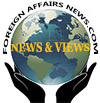With the growing conflict with China, the United States has pursued a policy of strengthening partnerships with smaller South Asian countries under the Indo-Pacific Strategy (IPS). The main purpose of the policy is to reduce China’s influence in these countries and to promote a rule-based international system.
For this, the United States is looking for key strategic partners in South Asia. “Under a major shift in US foreign policy, the Donald Trump administration is seeking not only trade with Bangladesh, Sri Lanka, the Maldives and other countries, but also strategic partnerships under the Indo-Pacific,” The Print Online quoted a senior news source as saying.
Citing a top news source, the online also mentioned that the US has recently started focusing more on India’s neighbors to reduce China’s influence.
Indian officials have said that as the United States increases its influence in neighboring countries, it will be easier to increase its influence in those countries under its first neighborhood policy.
US Secretary of State Mike Pompeo is scheduled to visit Sri Lanka on October 27 with the aim of reducing China’s influence and enhancing its Indo-Pacific strategy. During the visit, he will meet with the prime minister and president and announce a package of USD 480 million.
Before that, he will participate in an event between the US and India to be held in Indian capital. Recently, the Chinese Foreign Minister visited Sri Lanka and agreed to further deepen relations between the two countries.
The US Secretary of State is also expected to visit the Maldives, US officials said.
In recent times, as the conflict between the US and China and between India and China has escalated, the US and India seem to be working together to reduce China’s influence in the smaller South Asian countries.
Last week, US Assistant Secretary of State Stephen E. Wigan said there was a “basic alignment” between New Delhi and Washington.
Shortly after his visit to India, he visited Bangladesh.
He said the United States was ready to expand its strategic partnership with Bangladesh’s Foreign Minister AK Abdul Momen and to further strengthen the free and open Indo-Pacific.
Nepal, on the other hand, has been saying that it will not participate in any military alliance including IPS.
He also said that Bangladesh would be the center of US policy. Analysts say the growing cooperation between India and the United States will continue regardless of which party’s president comes to the United States. Meanwhile, India has also intensified its talks and dialogue with neighboring countries in recent times.
The US has also placed Nepal under the Indo-Pacific strategy. However, it is not certain that high-ranking US officials will or not visit Nepal in due course. During Foreign Minister Pradip Kumar Gyawali’s visit to the United States in December 2018, Secretary of State Pompeo stated that Nepal could play a central role in the Indo-Pacific region, which became a hot topic in Nepal.
Similarly, the Indo-Pacific report published by the US Department of Defense in June 2019 mentioned the issue of cooperation with Nepal.
Although the South Asian countries have been adopting neutrality in the conflicts of the big countries, their calves have started falling in these countries. The US-led Millennium Challenges Corporation (MCC) and China’s Bridge & Road Initiative (BRI) have clashed in smaller countries.
In recent times, China has been openly opposing the MCC. Recently, China’s official mouthpiece, the Global Times, has been publishing news against the MCC.
On October 14, the Global Times published a lengthy report on the MCC’s protests in various countries giving examples of the countries including Sri Lanka, the Philippines and Nepal.
Meanwhile, senior U.S. and international government officials, global industry executives, and other partners from the United States and the Indo-Pacific business community will gather virtually on October 27 and 28 for the 2020 Indo-Pacific Business Forum (IPBF).
The 2020 IPBF will promote trade, investment, and economic cooperation between the United States and its partners throughout the Indo-Pacific.
The themes for this year’s Forum are energy and infrastructure, the digital economy, market connectivity, health and economic recovery from the COVID-19 pandemic, and U.S.-Indo-Pacific partnerships and commercial opportunities.
The event is co-hosted with Vietnam, the current Association of Southeast Asian Nations (ASEAN) Chair.
This year’s IPBF builds on the success of the 2019 Indo-Pacific Business Forum held in-person in Bangkok in 2019.
Last year’s event featured more than 1,000 participants from 30 countries and showcased high-impact private sector investment and government efforts to support market competition, job growth, and high-standard infrastructure development, such as the Blue Dot Network, Asia Enhancing Development and Growth through Energy (EDGE), and the Infrastructure Transaction and Assistance Network (ITAN), for greater prosperity in the Indo-Pacific.






